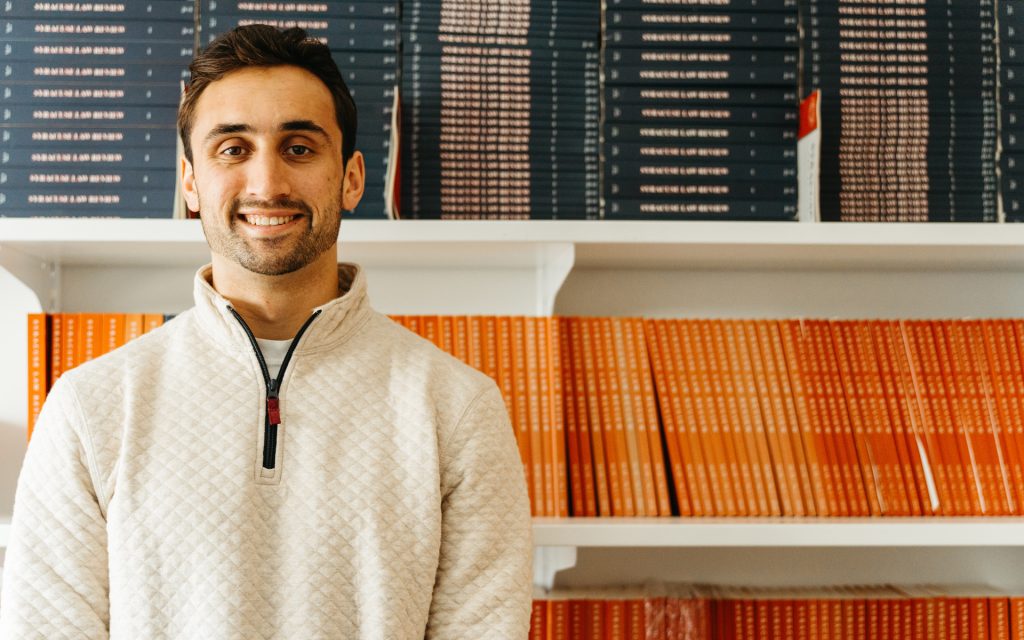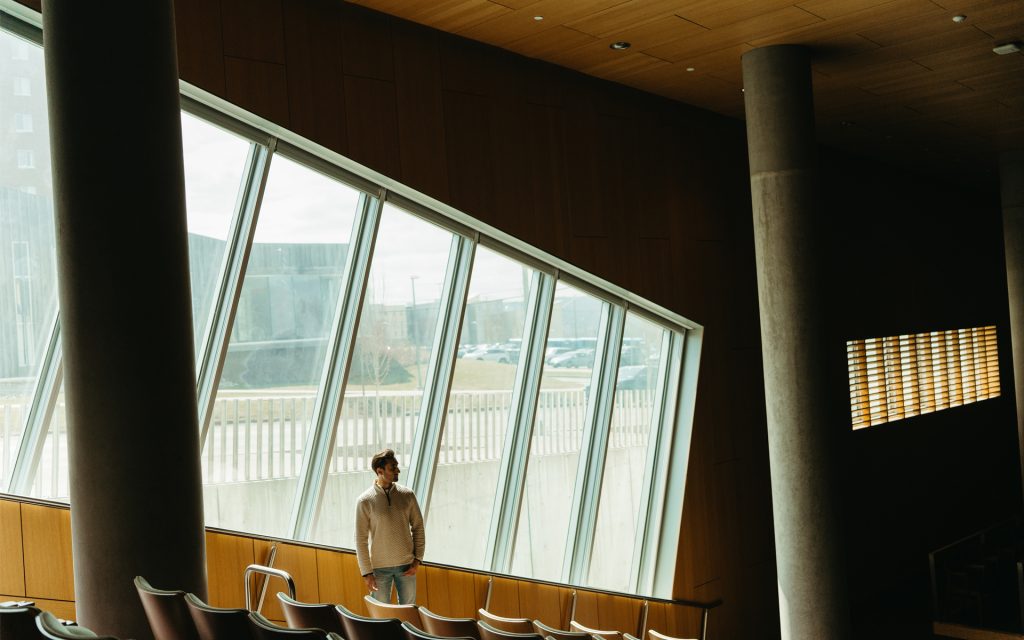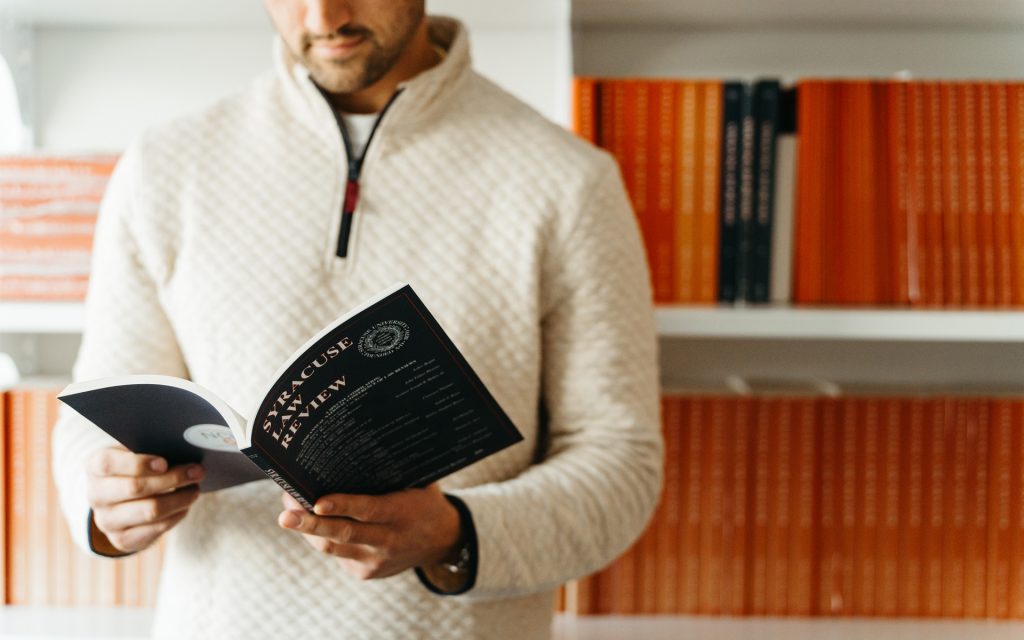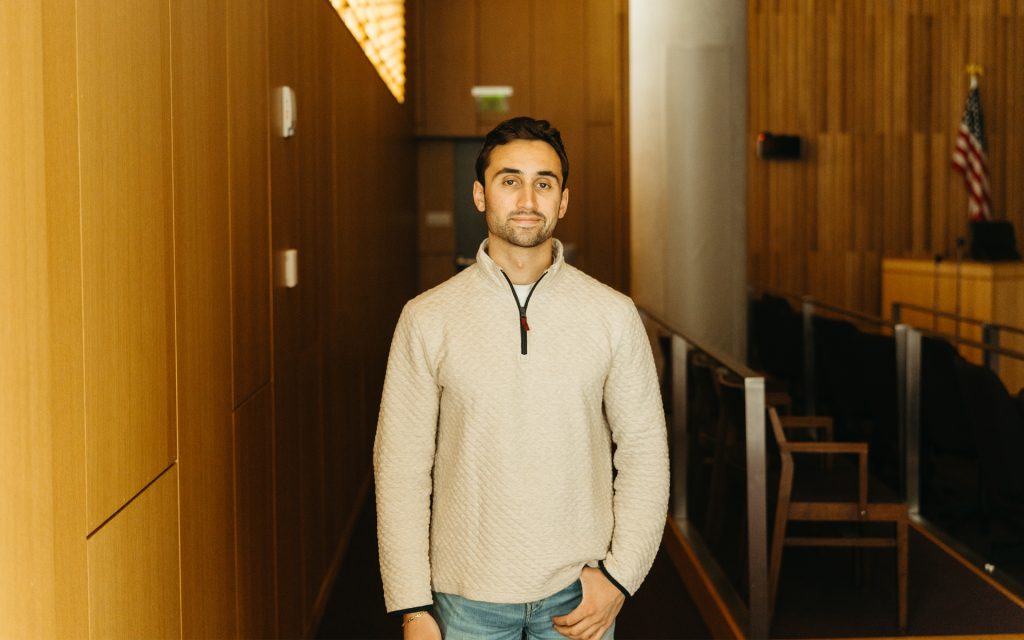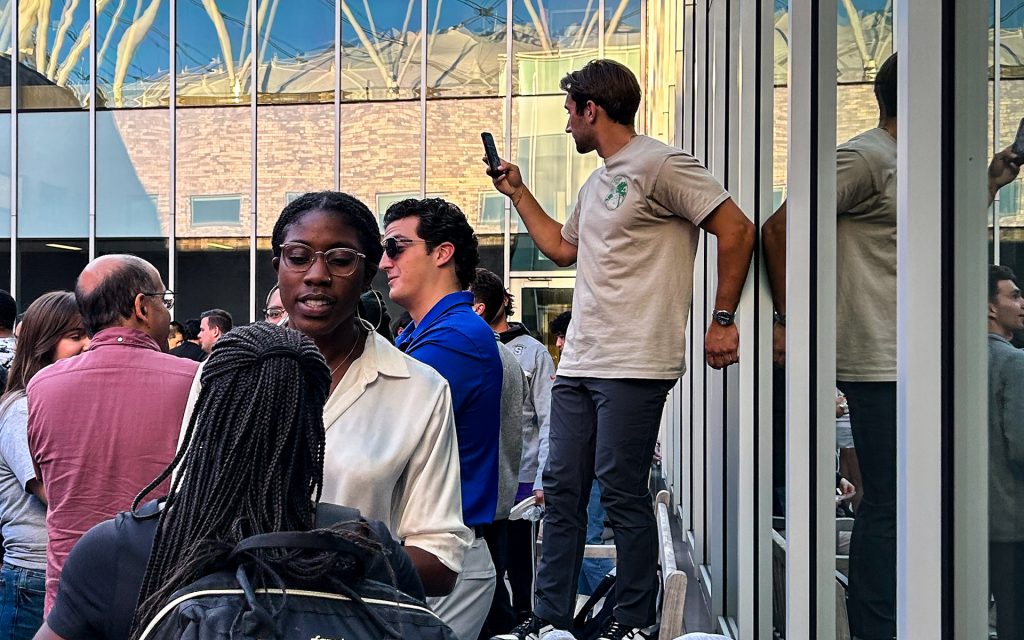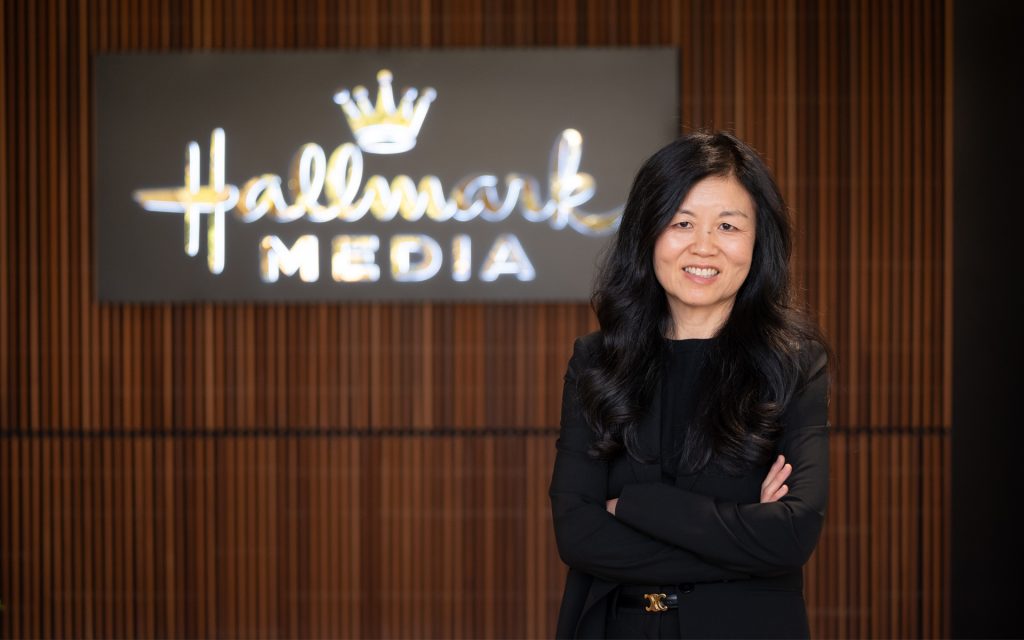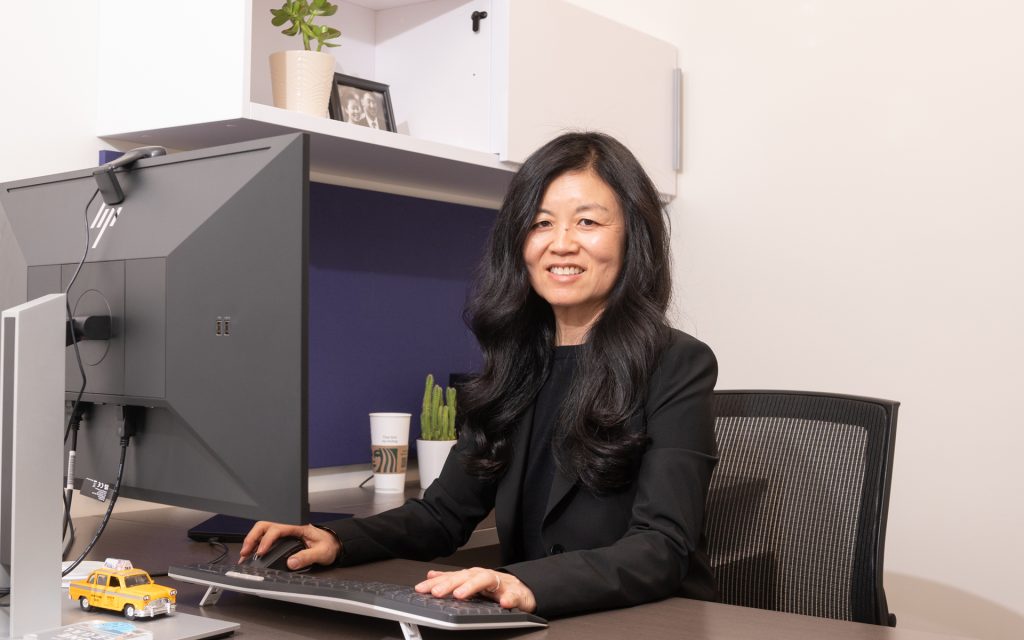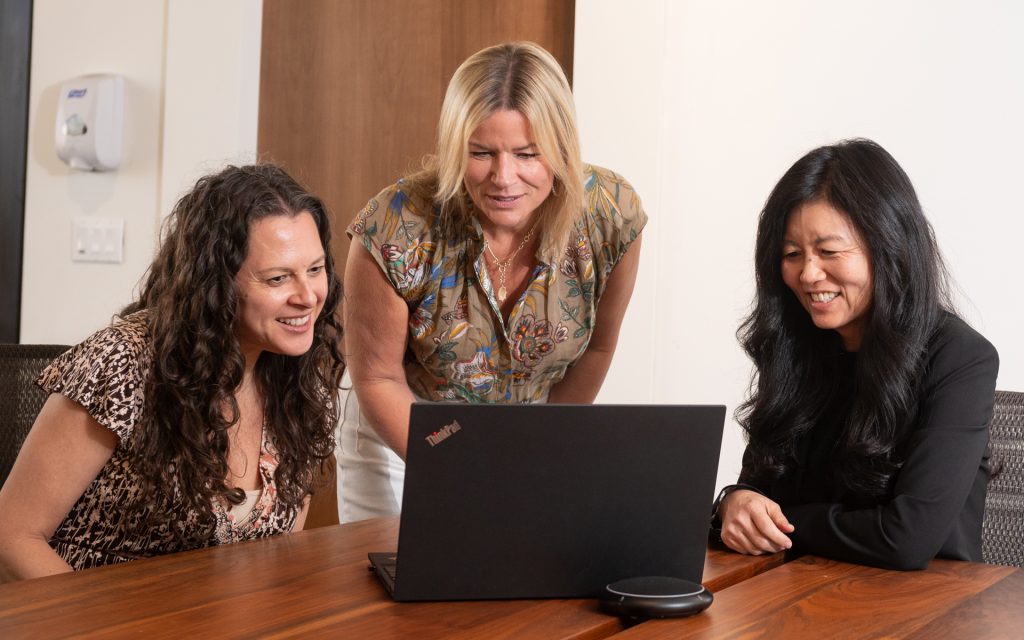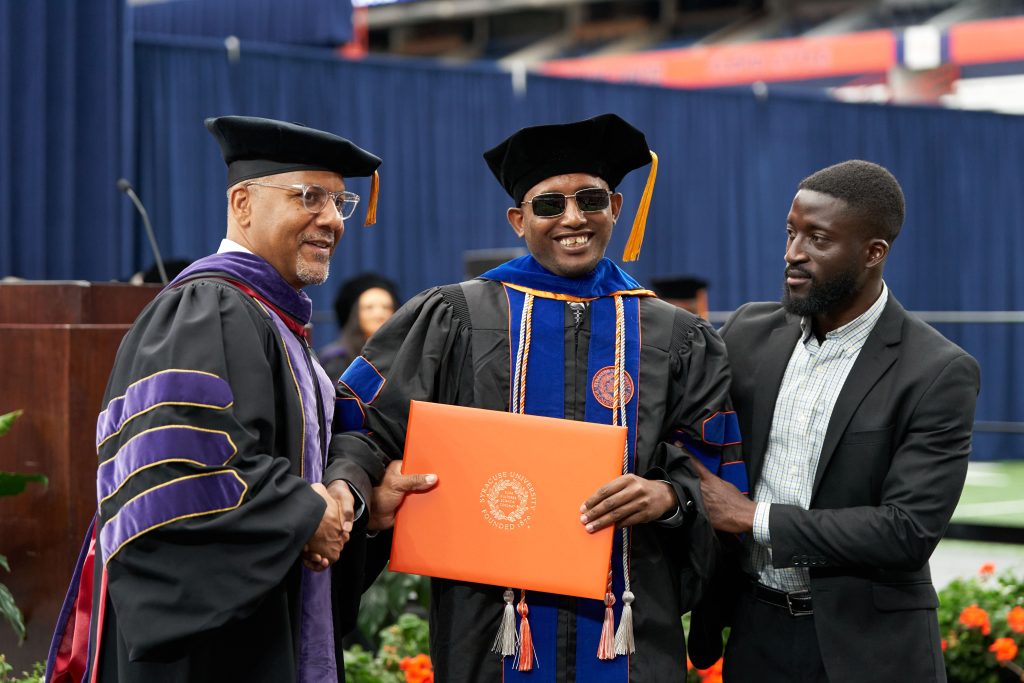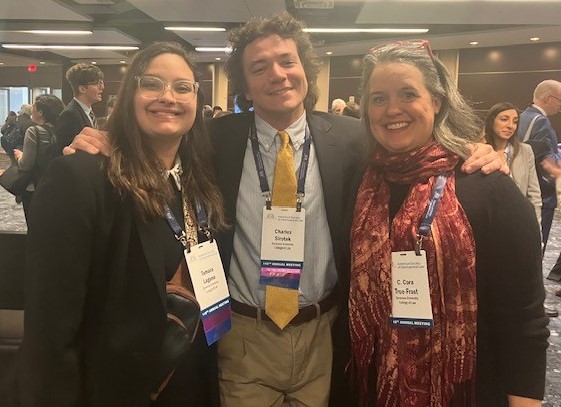In this legal review, Professor Gregory Germain examines the balance between a defendant’s Constitutional First Amendment rights and the state’s right to protect the judicial process as it relates to Judge Merchan’s gag order on Donald Trump.
Media wishing to interview Professor Germain on this or related topics should email Rob Conrad, director of communications and media relations.
I have previously written about the complex, or indeed convoluted, legal requirements that District Attorney Alvin Bragg must prove in order to properly convict Donald Trump of violating New York Penal Law § 175.10, which makes it a felony to falsify business records for the purpose of “defraud[ing]” someone, and also to cover up a separate crime. Germain, The Manhattan District Attorney’s Convoluted Legal Case Against Donald Trump Gets More Convoluted.
But there is separate mini-case going on within that criminal case that raises fundamental constitutional questions – what is the power of the court to gag a defendant from making out-of-court statements that criticize the court process or the other participants?
Gag orders bring into conflict two fundamental rights: the right of free speech protected by the First Amendment of the Constitution, and the right of the state to protect the judicial process. The underlying question is whether Judge Merchan’s gag order properly balances these conflicting interests to withstand constitutional scrutiny.
Judge Merchan’s Gag Order
Judge Merchan’s order prohibits Trump from engaging in three kinds of speech: (1) “public statements about witnesses “concerning their potential participation” in the case, (2) public statements about court personnel, lawyers and other participants, and their family members, if “made with intent to materially interfere with, counsel’s or staff’s work in this criminal case, or with knowledge that such interference is likely to result,” and (3) any statements about jurors.
The provisions regarding witnesses and court personnel are quite vague – what does it mean to criticize witnesses “concerning their participation?” Trump’s disparaging public statements concerned the witnesses’ character, rather than their participation in the case. Similarly, when are statements about court personnel designed to “interfere” with their work?
With respect to jurors, Judge Merchan’s original gag order only protected “juror anonymity.” His expanded order prohibited Trump from saying anything at all about jurors. Judge Merchan stated that the broad order was “narrowly tailored” “to prevent extrajudicial speech targeting jurors and exposing them to an atmosphere of intimidation.” But Judge Merchan has held Trump in contempt for making general comments about the political independence of the Manhattan jury pool, rather than for attacking individual jurors.
Judge Merchan justified the other speech restrictions to prevent Trump from continuing to make statements that:
“were threatening, inflammatory, denigrating, and the targets of his statements ranged from local and federal officials, court and court staff, prosecutors and staff assigned to the cases, and private individuals including grand jurors performing their civic duty. The consequences of those statements included not only fear on the part of the individual targeted, but also the assignment of increased security resources to investigate threats and protect the individuals and family members thereof. Such inflammatory extrajudicial statements undoubtedly risk impeding the orderly administration of this Court.”
So Judge Merchan’s order is based on two different concerns: (1) a concern for the safety of the participants, and (2) a desire to prevent criticism and denigration of the court process. As discussed below, the former concern is directed to the potential responses of Trump’s supporters to his words rather than to Trump’s words themselves, and the latter concern directly impinges on Trump’s constitutional right of free speech.
Findings of Contempt and the Threat of Jail
Judge Merchan has held Trump in contempt ten times, and has fined him the maximum of $10,000, for criticizing the jury pool in Manhattan and the jury selection process, for making disparaging comments about witnesses Stormy Daniels and Michael Cohen, who are both public figures actively engaged in making public comments about him, and for criticizing the judge and prosecutors as politically biased. In his 10th contempt order, Judge Merchan told Trump “”The defendant is hereby warned that the Court will not tolerate continued willful violations of its lawful orders and that if necessary and appropriate under the circumstances, it will impose an incarceratory punishment.”
Are Gag Orders Constitutional?
Constitutional protections are subject to various degrees of scrutiny depending on the issues involved. For example, governmental regulation of economic matters is reviewed under a very deferential standard –the government need only show a “legitimate governmental interest” to regulate economic matters.
But challenges to fundamental constitutional rights like free speech are subject to the highest standard of strict scrutiny: the government must show that the speech regulation is narrowly tailored to meet a compelling governmental interest. This comes from the famous “footnote 4” in United States v. Carolene Products Company, 304 U.S. 144 (1938), and has been emphasized in numerous decisions of the Court after that.
Is Judge Merchan’s gag order narrowly tailored to meet a compelling governmental interest? Gag orders are a prior restraint on free speech, since they prohibit future conduct rather than punishing past conduct. Prior restraints on free speech are subject to the strictest scrutiny. And prior restraints on the free speech of political candidates would presumably be subject to extra-strict strictest scrutiny.
Judge Merchan cited three Supreme Court cases to justify the Trump gag order, without discussing the holdings.
First, in Landmark Communications, Inc. v. Virginia, 435 US. 829, 842-843 (1978), the Court overturned the criminal conviction of a newspaper publisher who had identified the judge who was being investigated in a judicial conduct proceeding, which proceeding, under Virginia law, was supposed to be secret and confidential. The state attempted to justify the secret and confidential nature of judicial conduct proceedings by identifying various legitimate state interests in maintaining confidentiality: confidentiality encourages the filing of complaints and investigations of possible wrongdoing, protects the judge being investigated against the damage from publicity of unwarranted complaints, and it maintains confidence in the judiciary. The court overturned the publisher’s conviction finding the justifications insufficient to abridge the publisher’s free speech rights. “The publication Virginia seeks to punish under its statute lies near the core of the First Amendment, and the Commonwealth’s interests advanced by the imposition of criminal sanctions are insufficient to justify the actual and potential encroachments on freedom of speech and of the press which follow therefrom.” Id. at 838.
But the Court in Landmark went on to point out that the state’s justifications should not even be given weight in the constitutional balance.
“Moreover, neither the Commonwealth’s interest in protecting the reputation of its judges, nor its interest in maintaining the institutional integrity of its courts is sufficient to justify the subsequent punishment of speech at issue here, even on the assumption that criminal sanctions do in fact enhance the guarantee of confidentiality. Admittedly, the Commonwealth has an interest in protecting the good repute of its judges, like that of all other public officials. Our prior cases have firmly established, however, that injury to official reputation is an insufficient reason “for repressing speech that would otherwise be free.” The remaining interest sought to be protected, the institutional reputation of the courts, is entitled to no greater weight in the constitutional scales.
Id. at 841-42 (citations omitted). Thus, Landmark says that Judge Merchan’s concern for protecting the integrity of the judicial process or the reputations of the participants is not given weight against Trump’s constitutional right to speak.
The Landmark court went even further by suggesting that the standard for assessing threats borders on the “clear and present danger” test:
In a series of cases raising the question of whether the contempt power could be used to punish out-of-court comments concerning pending cases or grand jury investigations, this Court has consistently rejected the argument that such commentary constituted a clear and present danger to the administration of justice. What emerges from these cases is the “working principle that the substantive evil must be extremely serious and the degree of imminence extremely high before utterances can be punished,” and that a “solidity of evidence,” is necessary to make the requisite showing of imminence. “The danger must not be remote or even probable; it must immediately imperil.”
Id. at 844-45 (citations omitted).
One has to wonder whether Judge Merchan read the Supreme Court’s decision in Landmark before citing it as a basis for his gag order, as his justifications for the gag order would not even be given weight in balancing Trump’s free speech rights. And Landmark does not deal at all with the even stronger concerns about prior restraints as opposed to post-speech punishments.
The second case cited by Judge Merchan in support of the gag order is Sheppard v. Maxwell, 384 US 333 (1966), a famous case in which Sam Sheppard, a prominent neurosurgeon, was convicted of bludgeoning his wife to death. The issue in Sheppard was whether the criminal defendant received a fair trial when the trial court made no effort to protect him from negative publicity reaching the jury. In Sheppard, there were many things the court could have done to assure a fair trial without impeding freedom of speech and the press: better jury sequestration, change of venue, separating the participants from the press, controlling the dissemination of information. The Court said that the judge, who was up for re-election, created a “carnival atmosphere” in the courtroom that denied Sheppard his constitutional right to a fair trial. The focus of Sheppard was to protect the defendant’s constitutional fair trial right; there is nothing in Sheppard that supports a gag order preventing the defendant from criticizing the court or other participants.
Finally, Judge Merchan cited Nebraska Press Assn v. Stuart, 427 U.S. 539 (1976), which involved a gag order preventing the press from publishing certain incriminating information about the defendant in order to protect the defendant’s right to a fair trial. The case thus involved a direct conflict between two constitutional rights: the defendant’s constitutional right to a fair trial, and the free speech rights of the press under the first amendment. Once again, the Court held that the gag order was invalid because the trial court failed to consider other means to assure that the defendant received a fair trial, noting the extremely high constitutional standard for prior restraints on speech.
So none of the cases cited by Judge Merchan support his gag order. Sheppard and Stuart involved the defendant’s right to a fair trial, not restraints on a defendant’s speech, and neither case upheld or suggested the use of a gag order. Landmark specifically rejected the notion that a general concern with the public’s respect for the judicial process even counts in the balance against a constitutional right to free speech. The string citation of these important Supreme Court cases does not show the careful analysis of the law that one would expect when issuing an order preventing a presidential candidate during an election from exercising his First Amendment speech rights.
The DC Circuit’s Gag Order Against Trump
Judge Merchan’s gag order was modeled after the decision of the federal Court of Appeals in United States v. Trump, 88 F.4th 990 (D.C. Cir. 2023), although the gag order in that case applied to all of the trial participants, not just Trump. The D.C. Circuit upheld but modified the trial court’s gag order in the federal election interference case brought by prosecutor Jack Smith. That case is currently on appeal to the United States Supreme Court concerning the scope of presidential immunity.
Unlike Judge Merchan’s gag order, the D.C. Circuit’s 39 page opinion contains significant legal analysis and support. The opinion begins by recognizing Trump’s strong constitutional free speech rights, noting that “the First Amendment `has its fullest and most urgent application’ to speech uttered during a campaign for political office” and that “the First Amendment generally shields ‘insulting, and even outrageous, speech.’”
The DC Circuit also recognized that “Certain ‘historic and traditional categories’ of speech receive no First Amendment protection, such as defamation, incitement, ‘[t]rue threats of violence,’ and obscenity.”
But then the DC Circuit deviates from Supreme Court doctrine to state the broad principle upon which its opinion rests – that the court “system” (separate from the defendant’s constitutional right to a fair trial) has a compelling interest in protecting its “integrity” that should be weighed against the defendant’s constitutional right of free speech. And that the courts have broader latitude in restraining the participants in the case than in restraining non-participants.
The DC Circuit put a great deal of emphasis on the Supreme Court’s decision Gentile v. State Bar of Nevada, 501 U.S. 1030, 111 S.Ct. 2720, 115 L.Ed.2d 888 (1991), where the Court overturned the criminal conviction of a lawyer for the defendant, who had made out-of-court statements about the police being corrupt, and was later convicted for violating a Nevada state bar statute that prohibited an attorney from making “an extrajudicial statement . . . that . . . will have a substantial likelihood of materially prejudicing an adjudicative proceeding.”
After reading the DC Circuit’s opinion, you would think that the Court affirmed Gentile’s conviction. In fact, the Court overturned Gentile’s conviction, holding that Gentile’s statement as a matter of law did not have a substantial likelihood of prejudicing the proceeding. Nevertheless, the DC Circuit took comfort in the Court’s statement that “the First Amendment allows a court to prohibit the speech of a trial participant when the speech poses a ‘substantial likelihood of material prejudice’ to an adjudicative proceeding.”
The DC Circuit took that thin reed of dicta to conclude that the courts can limit participant “outside speech and influences [so that they] do not derail or corrupt the criminal trial process. On this record, the constitutional path for the presiding judge to protect both free speech and the fair and orderly administration of justice was not to limit what outsiders can say about the trial or trial participants, but to appropriately delimit what trial participants, including the accused, can say publicly to other participants, witnesses, or outsiders.”
The Court then suggested that Trump’s public comments about witnesses like Mark Meadows may have been designed to influence their testimony, and since the criminal law would prevent Trump from directly influencing a witness’s testimony, a gag order could prevent him from indirectly through the media attempting to influence a witness’s testimony. Judge Merchan expressed no similar concern about Trump indirectly attempting to influence witness testimony by his public statements.
Similarly, the DC Circuit stated that “threats” against court personnel could “generate alarm and dread” or “trigger extraordinary safety precautions” that would “hinder the trial process and slow the administration of justice.” That of course might be true of true “threats,” but is it also true of public criticism? This is a very vague concern that ignores the law of incitement, discussed below.
To balance the defendant’s free speech rights against protecting the judicial process, the DC Circuit added language preventing Trump from making statements about witnesses only if the statements “concern[ed] their participation” in the trial, and added language restricting statements about court personnel if he could reasonably foresee that it would interfere with their job.
Judge Merchan copied the DC Circuit’s language, limiting the gag order to statements about witnesses “concerning their participation,” and added language about “intending to interfere” for court personnel and opposing lawyers.
But the application of the DC Circuit’s language is opaque. Does the following tweet by Trump concern Michael Cohen’s “participation in the trial”: “If anyone is looking for a good lawyer, I would strongly suggest that you don’t retain the services of Michael Cohen!” Or does calling Michael Cohen a “liar” before he testified “concern his participation,” or does it concern his character? Does saying Judge Merchan is “politically compromised” prevent him from doing his job? I do not think the standard articulated by the DC Circuit is not clear enough to be workable, and the law requires injunctions to be clear so that the enjoined parties understand what they can and cannot do.
The First Department Appellate Division Order
Trump brought a proceeding under Article 78 of the New York Civil Law and Practice Rules (CPLR) seeking to overturn Judge Merchan’s gag order. The Appellate Division for the First Department held that Article 78 relief is discretionary, and, noting that a similar gag order was approved by the DC Circuit, denied his request. The Appellate Division said that the participants have a right to be free from “threats, intimidation, harassment and harm.” The Court did not seem concerned about abridging Trump’s constitutional right to speak.
Trump’s Prospects for Overturning the Gag Orders.
So far Trump has lost every attempt to challenge the gag orders. While the courts have paid lip service to his free speech rights, the courts have put their concerns for the judicial process ahead of his constitutional speech rights.
There is no doubt that courts have a fundamental responsibility to protect the safety of court personnel, witnesses, jurors, and other participants. And there are legitimate concerns in this case for the safety of the participants. Trump’s supporters have doxed and threatened his opponents. The DC Circuit said:
The district court made a factual finding that, “when Defendant has publicly attacked individuals, including on matters related to this case, those individuals are consequently threatened and harassed.” Mr. Trump has not shown that factual finding to be clearly erroneous, and we hold that the record amply supports it.
When Trump publicly attacks his opponents with words, his supporters have responded with threats and harassment. And there is a legitimate concern that his supporters might resort to violence, as we saw on January 6, 2021, when, following a Trump call to stop Congress from certifying Biden’s election, Trump’s supporters invaded the US Capitol.
But can Trump’s constitutional right to free speech be abridged because of the way that his supporters might react to his words? The Supreme Court has addressed this question in the incitement cases.
The starting point is Brandenberg v. Ohio, 395 US 444 (1969), where a Ku Klux Klan member invited the media to his farm to film a Klan meeting where they burned a cross and made racist and violent statements against blacks and jews. Brandenberg was convicted under an Ohio criminal statute for advocating violence and criminal conduct.
But the Supreme Court overturned his conviction, holding that Brandenberg’s belief in and advocacy of violence was protected speech under the First Amendment. The Brandenberg rule prevents the state from punishing speech even advocating violence unless that speech incites or produces “imminent lawless action and is likely to incite or produce such action.” The speaker must not only advocate violence, but must encourage that it be committed promptly, and provide a road map for its commission.
The same rule was applied in NAACP v. Claiborne Hardware Co., 458 U.S. 886 (1982), where the NAACP organized a boycott of white businesses as a civil rights protest. Charles Evers, the Field Secretary of the NAACP, made several speeches suggesting that black people who violated the boycott would “have their necks broken by their own people,” and “If we catch any of you going in any of them racist stores, we’re gonna break your damn neck.” The owners of the boycotted stores sued the NAACP for lost profits from the boycott due to Evers’ threats of violence. The Court, citing Brandenberg, held that Evans’ speech was protected by the First Amendment because it did not incite imminent lawless action.
Trump’s statements about the trial have not directly and explicitly called for violence, and certainly would not meet the incitement test of imminent lawless action. It is difficult to see how Trump’s speech could be curtailed because of the concern that his supporters might respond with harassment or even violence when he did not explicitly incite an imminent lawless response. Risks of violence exist in every legal case, and are especially concerning in in high profile cases involving celebrities. The courts surely could prohibit participants from inciting imminent lawless action or violence, but they cannot prohibit protected speech out of concern for the potential response of third parties. Instead, the court must rely on law enforcement to protect the safety of the participants. The concern for the response of supporters is not a legitimate basis for infringing on Trump’s constitutionally protected speech rights.
Furthermore, the court has repeatedly recognized in the cited cases that the integrity of the judicial process is fair game for public criticism. Judge Merchan cannot use his authority to prevent Trump from criticizing his decisions or his independence.
The Future of the Gag Order
In my opinion, the gag orders are not narrowly tailored to protect a compelling governmental interest, because there are many things the court could do to protect jurors and witnesses from being influenced by Trump’s public statements if that’s the real concern. Criticism of the judge and the judicial process is plainly protected speech. The gag orders also contain both vague and overbroad language under which he could be, and has been, punished even though his statements were protected speech.
Trump’s problem is that the lower courts are not likely to take his constitutional claims seriously, and it is a long road to get his constitutional claims from the state courts to the United States Supreme Court. I strongly doubt that the Supreme Court would consider intervening in a state court proceeding involving merely monetary sanctions in the thousands of dollars. Those sanctions can be challenged in due course on appeal, and would likely not be reviewed by the Supreme Court.
However, the calculus changes materially if Judge Merchan decides to put Trump in jail for violating the gag order. Jailing a presidential candidate during an election for engaging in speech would cause a constitutional crisis. If the state appellate courts did not promptly intervene, I believe the Supreme Court would intervene by certiorari to promptly hear his constitutional challenge to the gag order.
Trump and Judge Merchan have been engaged in a game of chicken over the possibility of a prison sentence. The repeated $1,000 sanctions awards have not stopped Trump from flouting the gag order by criticizing the court, the process and the witnesses. In response to Judge Merchan’s jail threat, a defiant Trump has said “I’d be proud to go to jail for the Constitution.” They are on a collision course for control, and, if Judge Merchan takes the bait, their tiff may ultimately lead to a clear Supreme Court ruling on the future scope of gag orders, which is probably long overdue.
I do not believe Judge Merchan’s gag order would withstand constitutional scrutiny before the Supreme Court, which has been very protective of First Amendment speech rights. The Court might allow a very clear and very limited gag order to prevent speech that would not be protected by the First Amendment, such as genuine incitement, but Judge Merchan’s broad, one-sided order preventing Trump from criticizing the court and witnesses, while not prohibiting the witnesses from criticizing him, is not consistent with the Court’s free speech precedent.

